- Home
- William Kennedy
Ironweed Page 17
Ironweed Read online
Page 17
“I read these once,” Billy said. “I never really knew how good you were. I heard stories and then one night downtown I heard a guy talking about you and he was ravin’ that you were top-notch and I never knew just how good. I knew this stuff was there. I seen it when we first moved here, so I went up and looked. You were really a hell of a ball player.”
“Not bad,” Francis said. “Coulda been worse.”
“These sportswriters liked you.”
“I did crazy things. I was good copy for them. And I had energy. Everybody likes energy.”
Billy offered Francis a glass of beer but Francis declined and took, instead, from Billy’s pack, a Camel cigarette; and then he perused the clips that told of him stealing the show with his fielding, or going four-for-four and driving in the winning run, or getting himself in trouble: such as the day he held the runner on third by the belt, an old John McGraw trick, and when a fly ball was hit, the runner got ready to tag and head home after the catch but found he could not move and turned and screamed at Francis in protest, at which point Francis let go of the belt and the runner ran, but the throw arrived first and he was out at home.
Nifty.
But Francis was thrown out of the game.
“Would you like to go out and look at the yard?” Annie said, suddenly beside Francis.
“Sure. See the dog.”
“It’s too bad the flowers are gone. We had so many flowers this year. Dahlias and snapdragons and pansies and asters. The asters lasted the longest.”
“You still got them geraniums right here.”
Annie nodded and put on her sweater and the two of them went out onto the back porch. The air was chilly and the light fading. She closed the door behind them and patted the dog, which barked twice at Francis and then accepted his presence. Annie went down the five steps to the yard, Francis and the dog following.
“Do you have a place to stay tonight, Fran?”
“Sure. Always got a place to stay.”
“Do you want to come home permanent?” she asked, not looking at him, walking a few steps ahead toward the fence. “Is that why you’ve come to see us?”
“Nah, not much chance of that. I’d never fit in.”
“I thought you might’ve had that in mind.”
“I thought of it, I admit that. But I see it couldn’t work, not after all these years.”
“It’d take some doing, I know that.”
“Take more than that.”
“Stranger things have happened.”
“Yeah? Name one.”
“You going to the cemetery and talking to Gerald. I think maybe that’s the strangest thing I ever heard in all my days.”
“Wasn’t strange. I just went and stood there and told him a bunch of stuff. It’s nice where he is. It’s pretty.”
“That’s the family plot.”
“I know.”
“There’s a grave there for you, right at the stone, and one for me, and two for the children next to that if they need them. Peg’ll have her own plot with George and the boy, I imagine.”
“When did you do all that?” Francis asked.
“Oh years ago. I don’t remember.”
“You bought me a grave after I run off.”
“I bought it for the family. You’re part of the family.”
“There was long times I didn’t think so.”
“Peg is very bitter about you staying away. I was too, for years and years, but that’s all done with. I don’t know why I’m not bitter anymore. I really don’t. I called Peg and told her to get the cranberries and that you were here.”
“Me and the cranberries. Easin’ the shock some.”
“I suppose.”
“I’ll move along, then. I don’t want no fights, rile up the family.”
“Nonsense. Stop it. You just talk to her. You’ve got to talk to her.”
“I can’t say nothin’ that means anything. I couldn’t say a straight word to you.”
“I know what you said and what you didn’t say. I know it’s hard what you’re doing.”
“It’s a bunch of nothin’. I don’t know why I do anything in this goddamn life.”
“You did something good coming home. It’s something Danny’ll always know about. And Billy. He was so glad to be able to help you, even though he’d never say it.”
“He got a bum out of jail.”
“You’re so mean to yourself, Francis.”
“Hell, I’m mean to everybody and everything.”
The bleachers were all up, and men were filing silently into them and sitting down, right here in Annie’s backyard, in front of God and the dog and all: Bill Corbin, who ran for sheriff in the nineties and got beat and turned Republican, and Perry Marsolais, who inherited a fortune from his mother and drank it up and ended up raking leaves for the city, and Iron Joe himself with his big mustache and big belly and big ruby stickpin, and Spiff Dwyer in his nifty pinched fedora, and young George Quinn and young Martin Daugherty, the batboys, and Martin’s grandfather Emmett Daugherty, the wild Fenian who talked so fierce and splendid and put the radical light in Francis’s eye with his stories of how moneymen used workers to get rich and treated the Irish like pigdog paddyniggers, and Patsy McCall, who grew up to run the city and was carrying his ball glove in his left hand, and some men Francis did not know even in 1899, for they were only hangers-on at the saloon, men who followed the doings of Iron Joe’s Wheelbarrow Boys, and who came to the beer picnic this day to celebrate the Boys’ winning the Albany-Troy League pennant.
They kept coming: forty-three men, four boys, and two mutts, ushered in by the Fiddler and his pals.
And there, between crazy Specky McManus in his derby and Jack Corbett in his vest and no collar, sat the runt, is it?
Is it now?
The runt with the piece out of his neck.
There’s one in every crowd.
Francis closed his eyes to retch the vision out of his head, but when he opened them the bleachers still stood, the men seated as before. Only the light had changed, brighter now, and with it grew Francis’s hatred of all fantasy, all insubstantiality. I am sick of you all, was his thought. I am sick of imagining what you became, what I might have become if I’d lived among you. I am sick of your melancholy histories, your sentimental pieties, your goddamned unchanging faces. I’d rather be dyin’ in the weeds than standin’ here lookin’ at you pinin’ away, like the dyin’ Jesus pinin’ for an end to it when he knew every stinkin’ thing that was gonna happen not only to himself but to everybody around him, and to all those that wasn’t even born yet. You ain’t nothin’ more than a photograph, you goddamn spooks. You ain’t real and I ain’t gonna be at your beck and call no more.
You’re all dead, and if you ain’t, you oughta be.
I’m the one is livin’. I’m the one puts you on the map.
You never knew no more about how things was than I did.
You’d never even be here in the damn yard if I didn’t open that old trunk.
So get your ass gone!
“Hey Ma,” Billy yelled out the window. “Peg’s home.”
“We’ll be right in,” Annie said. And when Billy closed the window she turned to Francis: “You want to tell me anything, ask me anything, before we get in front of the others?”
“Annie, I got five million things to ask you, and ten million things to tell. I’d like to eat all the dirt in this yard for you, eat the weeds, eat the dog bones too, if you asked me.”
“I think you probably ate all that already,” she said.
And then they went up the back stoop together.
o o o
When Francis first saw his daughter bent over the stove, already in her flowered apron and basting the turkey, he thought: She is too dressed up to be doing that. She wore a wristwatch on one arm, a bracelet on the other, and two rings on her wedding ring finger. She wore high heels, silk stockings with the seams inside out, and a lavender dress that was never intended as a k
itchen costume. Her darkbrown hair, cut short, was waved in a soft marcel, and she wore lipstick and a bit of rouge, and her nails were long and painted dark red. She was a few, maybe even more than a few, pounds overweight, and she was beautiful, and Francis was immeasurably happy at having sired her.
“How ya doin’, Margaret?” Francis asked when she straightened up and looked at him.
“I’m doing fine,” she said, “no thanks to you.”
“Yep,” said Francis, and he turned away from her and sat across from Billy in the nook.
“Give him a break,” Billy said. “He just got here, for chrissake.”
“What break did he ever give me? Or you? Or any of us?”
“Aaahhh, blow it out your ear,” Billy said.
“I’m saying what is,” Peg said.
“Are you?” Annie asked. “Are you so sure of what is?”
“I surely am. I’m not going to be a hypocrite and welcome him back with open arms after what he did. You don’t just pop up one day with a turkey and all is forgiven.”
“I ain’t expectin’ to be forgiven,” Francis said. “I’m way past that.”
“Oh? And just where are you now?”
“Nowhere.”
“Well that’s no doubt very true. And if you’re nowhere, why are you here? Why’ve you come back like a ghost we buried years ago to force a scrawny turkey on us? Is that your idea of restitution for letting us fend for ourselves for twenty-two years?”
“That’s a twelve-and-a-half-pound turkey,” Annie said.
“Why leave your nowhere and come here, is what I want to know. This is somewhere. This is a home you didn’t build.”
“I built you. Built Billy. Helped to.”
“I wish you never did.”
“Shut up, Peg,” Billy yelled. “Rotten tongue of yours, shut it the hell UP!”
“He came to visit, that’s all he did,” Annie said softly. “I already asked him if he wanted to stay over and he said no. If he wanted to he surely could.”
“Oh?” said Peg. “Then it’s all decided?”
“Nothin’ to decide,” Francis said. “Like your mother says, I ain’t stayin’. I’m movin’ along.” He touched the salt and pepper shaker on the table in front of him, pushed the sugar bowl against the wall.
“You’re moving on,” Peg said.
“Positively.”
“Fine.”
“That’s it, that’s enough!” Billy yelled, standing up from the bench. “You got the feelin’s of a goddamn rattlesnake.”
“Pardon me for having any feelings at all,” Peg said, and she left the kitchen, slamming the swinging door, which had been standing open, slamming it so hard that it swung, and swung, and swung, until it stopped.
“Tough lady,” Francis said.
“She’s a creampuff,” Billy said. “But she knows how to get her back up.”
“She’ll calm down,” Annie said.
“I’m used to people screamin’ at me,” Francis said. “I got a hide like a hippo.”
“You need it in this joint,” Billy said.
“Where’s the boy?” Francis asked. “He hear all that?”
“He’s out playin’ with the ball and glove you gave him,” Billy said.
“I didn’t give him the glove,” Francis said. “I give him the ball with the Ty Cobb signature. That glove is yours. You wanna give it to him, it’s okay by me. Ain’t much of a glove compared to what they got these days. Danny’s glove’s twice the quality my glove ever was. But I always thought to myself: I’m givin’ that old glove to Billy so’s he’ll have a touch of the big leagues somewhere in the house. That glove caught some mighty people. Line drive from Tris Speaker, taggin’ out Cobb, runnin’ Eddie Collins outa the baseline. Lotta that.”
Billy nodded and turned away from Francis. “Okay,” he said, and then he jumped up from the bench and left the kitchen so the old man could not see (though he saw) that he was choked up.
“Grew up nice, Billy did,” Francis said. “Couple of tough bozos you raised, Annie.”
“I wish they were tougher,” Annie said.
The yard, now ablaze with new light against a black sky, caught Francis’s attention. Men and boys, and even dogs, were holding lighted candles, the dogs holding them in their mouths sideways. Specky McManus, as usual hem’ different, wore his candle on top of his derby. It was a garden of acolytes setting fire to the very air, and then, while Francis watched, the acolytes erupted in song, but a song without sense, a chant to which Francis listened carefully but could make out not a word. It was an antisyllabic lyric they sang, like the sibilance of the wren’s softest whistle, or the tree frog’s tonsillar wheeze. It was clear to Francis as he watched this performance (watched it with awe, for it was transcending what he expected from dream, from reverie, even from Sneaky Pete hallucinations) that it was happening in an arena of his existence over which he had less control than he first imagined when Aldo Campione boarded the bus. The signals from this time lock were ominous, the spooks utterly without humor. And then, when he saw the runt (who knew he was being watched, who knew he didn’t belong in this picture) putting the lighted end of the candle into the hole in the back of his neck, and when Francis recognized the chant of the acolytes at last as the “Dies Irae,” he grew fearful. He closed his eyes and buried his head in his hands and he tried to remember the name of his first dog.
It was a collie.
o o o
Billy came back, clear-eyed, sat across from Francis, and offered him another smoke, which he took. Billy topped his own beer and drank and then said, “George.”
“Oh my God,” Annie said. “We forgot all about George.” And she went to the living room and called upstairs to Peg: “You should call George and tell him he can come home.”
“Let her alone, I’ll do it,” Billy called to his mother.
“What about George?” Francis asked.
“The cops were here one night lookin’ for him,” Billy said. “It was Patsy McCall puttin’ pressure on the family because of me. George writes numbers and they were probably gonna book him for gamblin’ even though he had the okay. So he laid low up in Troy, and the poor bastard’s been alone for days. But if I’m clear, then so is he.”
“Some power the McCaIls put together in this town.”
“They got it all. They ever pay you the money they owed you for registerin’ all those times?”
“Paid me the fifty I told you about, owe me another fifty-five. I’ll never see it.”
“You got it comin’.”
“Once it got in the papers they wouldn’t touch it. Mixin’ themselves up with bums. You heard Martin tell me that. They’d also be suspicious that I’d set them up. I wouldn’t set nobody up. Nobody.”
“Then you got no cash.”
“I got a little.”
“How much?”
“I got some change. Cigarette money.”
“You blew what you had on the turkey.”
“That took a bit of it.”
Billy handed him a ten, folded in half. “Put it in your pocket. You can’t walk around broke.”
Francis took it and snorted. “I been broke twenty-two years. But I thank ye, Billy. I’ll make it up.”
“You already made it up.” And he went to the phone in the dining room to call George in Troy.
Annie came back to the kitchen and saw Francis looking at the Chadwick Park photo and looked over his shoulder. “That’s a handsome picture of you,” she said.
“Yeah,” said Francis. “I was a good-lookin’ devil.”
“Some thought so, some didn’t,” Annie said. “I forgot about this picture.”
“Oughta get it framed,” Francis said. “Lot of North Enders in there. George and Martin as kids, and Patsy McCall too. And Iron Joe. Real good shot of Joe.”
“It surely is,” Annie said. “How fat and healthy he looks.”
Billy came back and Annie put the photo on the table so that all three of them
could look at it. They sat on the same bench with Francis in the middle and studied it, each singling out the men and boys they knew. Annie even knew one of the dogs.
“Oh that’s a prize picture,” she said, and stood up. “A prize picture.”
“Well, it’s yours, so get it framed.”
“Mine? No, it’s yours. It’s baseball.”
“Nah, nah, George’d like it too.”
“Well I will frame it,” Annie said. “I’ll take it downtown and get it done up right.”
“Sure,” said Francis. “Here. Here’s ten dollars toward the frame.”
“Hey,” Billy said.
“No,” Francis said. “You let me do it, Billy.”
Billy chuckled.
“I will not take any money,” Annie said. “You put that back in your pocket.”
Billy laughed and hit the table with the palm of his hand. “Now I know why you been broke twenty-two years. I know why we’re all broke. It runs in the family.”
“We’re not all broke,” Annie said. “We pay our way. Don’t be telling people we’re broke. You’re broke because you made some crazy horse bet. But we’re not broke. We’ve had bad times but we can still pay the rent. And we’ve never gone hungry.”
“Peg’s workin’,” Francis said.
“A private secretary,” Annie said. “To the owner of a tool company. She’s very well liked.”
“She’s beautiful,” Francis said. “Kinda nasty when she puts her mind to it, but beautiful.”
“She shoulda been a model,” Billy said.
“She should not,” Annie said.
“Well she shoulda, goddamn it, she shoulda,” said Billy. “They wanted her to model for Pepsodent toothpaste, but Mama wouldn’t hear of it. Somebody over at church told her models were, you know, loose ladies. Get your picture taken, it turns you into a floozy.”

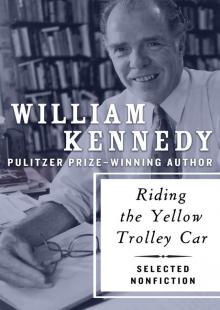 Riding the Yellow Trolley Car: Selected Nonfiction
Riding the Yellow Trolley Car: Selected Nonfiction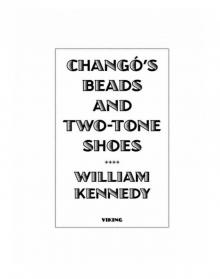 Changó's Beads and Two-Tone Shoes
Changó's Beads and Two-Tone Shoes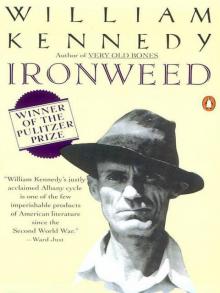 Ironweed
Ironweed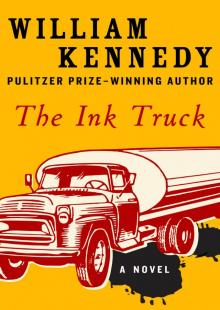 The Ink Truck
The Ink Truck Billy Phelan's Greatest Game
Billy Phelan's Greatest Game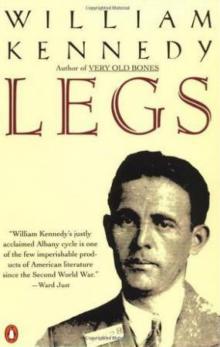 Legs
Legs Very Old Bones
Very Old Bones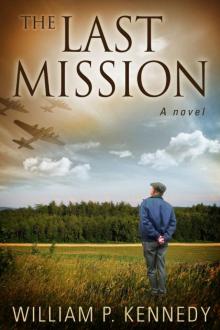 The Last Mission
The Last Mission The Flaming Corsage
The Flaming Corsage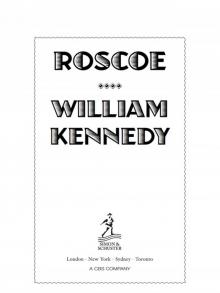 Roscoe
Roscoe Quinn's Book
Quinn's Book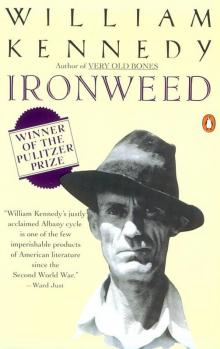 Ironweed (1984 Pulitzer Prize)
Ironweed (1984 Pulitzer Prize)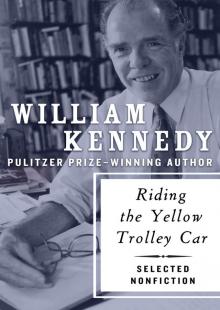 Riding the Yellow Trolley Car
Riding the Yellow Trolley Car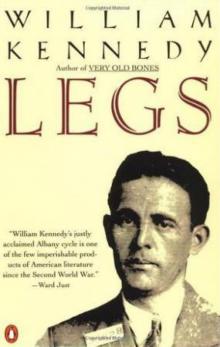 Legs - William Kennedy
Legs - William Kennedy